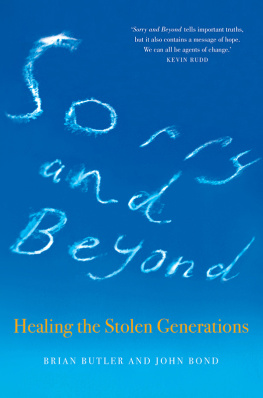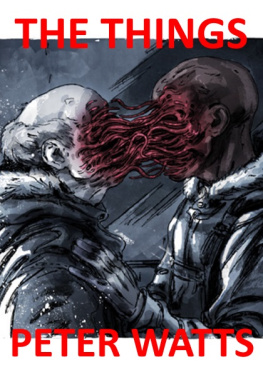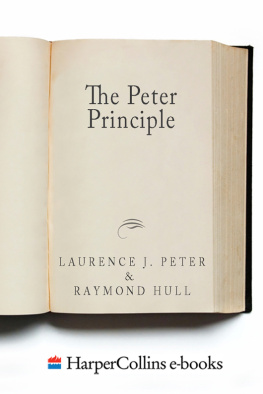For J.M.A.
In gratitude
First published 1999 by Allen & Unwin
Published 2020 by Routledge
2 Park Square, Milton Park, Abingdon, Oxon OX14 4RN
605 Third Avenue, New York, NY 10017
Routledge is an imprint of the Taylor & Francis Group, an informa business
Copyright Peter Read, 1999
All rights reserved. No part of this book may be reprinted or reproduced or utilised in any form or by any electronic, mechanical, or other means, now known or hereafter invented, including photocopying and recording, or in any information storage or retrieval system, without permission in writing from the publishers.
Notice:
Product or corporate names may be trademarks or registered trademarks, and are used only for identification and explanation without intent to infringe.
National Library of Australia
Cataloguing-in-Publication entry:
Read, Peter, 1945.
A rape of the soul so profound: the return of the
stolen generations.
Bibliography.
Includes index.
ISBN 1 86448 885 9.
1. Link-up. 2. Aborigines, Australian-Families. 3. Family
reunions-Government policy-Australia. 4. Aborigines,
Australian-Treatment. 5. Aborigines, Australian-Removal.
6. Aborigines, Australian-Child welfare. 7. Aborigines,
Australian-Government policy. I. Title.
362.849915094
Set in 11/13 pt Goudy Old Style by DOCUPRO, Sydney
ISBN-13: 9781864488852 (pbk)
The author is grateful to the following publishers who have consented to allow the material in this book to be republished:
Viking Books, Overland, Aboriginal History Inc., Trans-world Publishers, Link-Up (NSW) Aboriginal Corporation, the Institute for Aboriginal Development, the NSW Ministry of Aboriginal Affairs and the Humanities Research Centre ANU.
I am particularly grateful to Joy Williams for the use of some photographs previously unpublished and for our continuing conversations, to an anonymous referee, to John Iremonger for his perceptive comments on rearranging the material, and to my editor David Horton who, through laborious and thoughtful use of the cut and paste buttons, re-organised the manuscript and revealed to me the whole work in a new and constructive light.
Since the 1970s I have worked both as a historian of Aboriginal Australia and for a time as an employee of Link-Up (NSW). The writings in this book are drawn from articles, interviews, pamphlets and submissions which I wrote between 1976 and 1998. All concern, in various ways, those Aboriginal people who were removed from their families while children and raised apart from their communities and their Indigenous inheritance.
Since almost all the pieces here were written for particular purposes, they have been altered to varying degrees to make them relevant to the present book. None appears exactly in its original form, while others have been altered substantially, added to and subtracted from to create a more coherent narrative and to avoid repetition. When I used the word we to refer to Aborigines, I did so not because I am Aboriginal, but because I had been asked to write on behalf of an Aboriginal organisation or group.
When I wrote the pamphlet The Stolen Generations in 1981, child separation was scarcely talked about. Non-Aborigines said that it couldn t have happened. The victims of separation thought it shameful, a shame job to talk about their removal. They believed that maybe their parents had not been able to care for them properly, or worse still, didn t want them.
Eighteen years later, thousands of children throughout Australia have spoken out against the pain they endured, and are still enduring. So have the parents, and extended families of the children. Whole communities have expressed what it meant to have their families traumatised, their future leadership removed and blown to the four winds. Now we can see the policy for what it was-an attempt to terminate and prevent the reappearance of the nations Indigenous people.
As the National Enquiry showed in 199596, the hurt of separation never ends. But at least now the non-Aborigines concede that the policy happened, and that it was wrong. The victims of separation understand that their families grieved for their children as much as the children grieved for them. State premiers and church leaders have apologised. There are now organisations carrying out Link-Up work in every state and the Northern Territory.
The last sentences of The Stolen Generations were:
Perhaps in time the whites will suffer in the knowledge of what they have done. But they cannot expect forgiveness.
Many readers in 1981 were upset by this conclusion. Now we can ask: Have they, after nearly twenty years, achieved forgiveness? My answer is No, they have not, despite the massive and thrilling wave of public sympathy before and during Sorry Day 1998. For the financial future of the Link-Up organisations is by no means, as yet, secure. There are not yet absolute legal guarantees that the separation process cannot begin again. And in August 1998 the Western Australian police, with government support, proposed to again begin separating certain Aboriginal children from their parents. Have we learnt nothing at all?
We must insist that Aboriginal children are never again separated from their families and those who are grieving be allowed to heal, whatever the cost. National reconciliation requires it, common humanity demands it.
The Stolen Generations: Who are we?
The Stolen Generations have become an enormously powerful symbol (along with Mabo and Deaths in Custody) of the relationship between Aboriginal and non-Aboriginal Australia. Following the 1998 federal election Prime Minister Howard, evidently intending to promote reconciliation in his second term, could not see that an apology to the stolen generations was a prerequisite for that reconciliation. Shortly after the election he announced that It is not so much the fear of compensation claims that constrains me on that, it is a belief I have, a very genuine belief, that you express collective regret for things for which you are collectively and in a direct sense responsible I dont think that applies to the current generation of Australians. Yet I will show in this book that every generation of Australians, including the current generation, for the last 210 years, is collectively and in a direct sense responsible for what was done, by government and church, in the name of the Australian people.
So who are the Stolen Generations, what was done to them, and why does their fate haunt the Aboriginal community today? It would be easy to lose the individuals in the larger political nation, but throughout this book it is the individuals whom I have met and often worked with over the last 25 years that have been foremost in my mind. They include Joy Williams, baffled as to why she was taken from her mother and sent to a non-Aboriginal institution until she obtained the chilling committal notice-Reason for admission: a fair skinned child to be taken from association with Aborigines. Clarrie Nean, sent to jail for running away from the intolerable conditions of Kinchela, later found dead in a police cell. Russell Moore, adopted into a white family, later to commit a horrific murder in the US and to escape execution narrowly. And Jane King, doomed by psychological trauma endlessly and futilely to clean not only her flat, but the streets outside her home. While the stories are individual, each fragment fills out a picture of generations of separated children, one brush stroke at a time.







